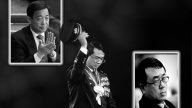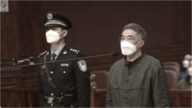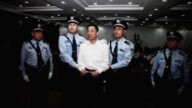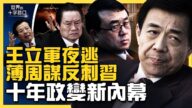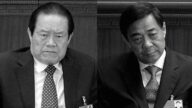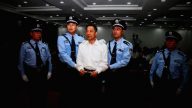【新唐人2012年3月30日讯】中国内部发生的政坛地震扩散到了国际,欧美及日本媒体近来纷纷关注薄熙来事件。《产经新闻》3月28号报导,中共将在5月份的重庆市党代会上,肃清薄熙来在重庆的势力。而欧美学者也针对薄熙来事件的发展发表评论,其中英国《卫报》提出,中国需要的改革不是薄熙来的“重庆模式”。那么,中国未来需要的是一个什么样的体制模式呢? 下面请看专家学者的分析。
《产经新闻》的报导说,来自中共内部的消息人士声称,如果对薄熙来的指控成立的话,那么薄熙来的“政治局常委”资格,可能在今年秋季十八大召开之前的第7次中央会议上被剥夺。
而重庆的领导班子在王立军事件,特别是薄熙来被免职以来,已有多次调整。亲近薄熙来的重庆市组织部长陈存根,26号被中共中央解除了重庆市党委会常务委员资格。《产经新闻》认为,由于陈存根担任重庆市人事权的一把手,他的解职,标志着薄熙来一派失去了对重庆人事部门的控制权。
中国著名异议人士魏京生:“我想应该是所有的腐败统统清理,这样才能使中国社会变得正常一些,如果仅仅是清理一个薄熙来,我想不是解决根本问题的方法。如果中共要彻底的解决问题,就是中共必须得下台了,然后就换成另外一个制度,因为毕竟从制度层面来改革,来彻底改革政治体制,才有可能解决像腐败及其他各种问题。”
台北《中央社》 27号发自华盛顿的报导说,“加州克雷蒙特麦肯纳学院”(Claremont McKennaCollege)政治学者裴敏欣接受“美国外交关系协会”﹝Council on Foreign Relations)访问指出,“薄熙来案”并非中共意识型态之争,而是权力斗争。
魏京生:“也就是说他这种蛮不讲理的使用专政工具的方式,不但威胁到普通老百姓而且威胁到一般的干部和商人,所以说这种模式,基本上就不管是唱红还是打黑,就是要回到极端专政的模式去。”
英国《卫报》28号晚间,也在官方网络版发表评论文章说,中国需要的改革不是薄熙来的“重庆模式”。
魏京生:“当然共产党实践几十年的经验告诉人们这是骗人的,到最后还是老百姓生活很困难,而且还会面临一个蛮横不讲理的专政,所以说这两方面都是老百姓所不希望的,这个重庆模式、江鬼给中国带来的最大危害,我觉得就是回到一党专政、也加强了一党专政。”
纽约民主大学执行主任汪北稷认为,中共从来没有说过民主化中国,而是改革开放。
汪北稷:“政治不需要你改革,政治需要民主,你怎么改革呢,对不对,所以呢,由于这个长期以来洗脑党文化造成我们,它引入我们进入一个思维,我们是要‘汪洋模式’还是‘薄熙来模式’,两个模式我们都不要,人民需要的是非中共模式、解体中共模式,你离开这个舞台,由人民来自发的组织政党、组织知识份子、组织各种精英,大家通过民主的、合法的、合理的程序来选出方案,来管理国家。”
汪北稷还表示,实际上破坏中国整个安定的最大祸首是中共,薄熙来看起来激烈,但是从13亿人民60年来所受的苦难来讲的话,中共最激烈,薄熙来还次之。
————————
The Sankei Shimbun: Bo‘s followers in Chongqing Will be Cleared by May
The political earthquake within the CCP induced by the
Bo Xilai incident has drawn worldwide attention,
and recently both western and Japanese media
have been covering it closely.
On March 28th, a Japanese daily newspaper,
the Sankei Shimbun, wrote an article claiming that
the CCP Central Committee would root out all of Bo’s
followers in Chongqing during the city party congress this May.
Western scholars also made remarks regarding
the development of the Bo Xilai incident.
A British Guardian article conveyed that the Chongqing
mode pushed by Bo is not the kind of reform China needs.
Then what should the future government in China be?
The Sankei Shimbun article cited an internal source who
claimed that
Bo Xilai‘s central politburo membership will be abolished
if he is found guilty of the accusations currently being established.
Furthermore, this would probably take place in the 7th Plenary
Session before the 18th CCP National Congress this coming autumn.
The leadership group of Chongqing, however, has already
changed many times after Wang Lijun’s attempted defect, especially since the dismissal of Bo Xilai.
Chen Cungen, director of the city Organization Department
and one of Bo’s close associates,
was deprived of his membership in the CCP’s city standing
committee on March 26th.
The Sankei Shimbun remarked that the dismissal of Chen
marks the loss of control of the Bo Xilai faction.
(Chinese dissident Wei Jingsheng):”I believe that to restore
Chinese society to its normal state, all corruption has to be eliminated.
Clearing Bo Xilai himself won’t make things change much.
If the CCP wants to deal with this in a thorough way,
it has to step down from governing China. Then a new government will be established.
Only complete political reform, can possibly be the solution
to eliminating corruption and other issues.”
(Claremont McKennaCollege)﹝Council on Foreign Relations﹞
On March 27th, the Taipei-based Central News Agency
reported from Washington that, Pei Minxin, a political scholar
from Claremont McKenna College, said in an interview
with the Council on Foreign Relations that what the Bo Xilai
incident induced inside the CCP is a power struggle,
not an ideological conflict.
(Wei Jingsheng): ”This is to say, the savage and unreasonable
ways of the dictatorship is not only a threat to civilians, but also to most officials and businessmen.
The Chongqing model, with its ‘singing red songs’
and ‘anti-corruption campaign,’is retrogression to an extreme dictatorship regime.”
On March 28th, the Guardian UK published an article
on its website remarking that, Bo Xilai’s “Chongqing model” is not the kind of reform China needs.
(Wei Jingsheng): ”All the CCP’s political movements
in the last several decades have taught us you can’t trust any kind of reform.
In the end it’s always the civilians who suffer most
and the dictatorship regime never changes.
Neither of them is what Chinese people would like to see.
In my opinion, the worst thing about the ‘Chongqing model’
and Jiang Zemin’s governing is that they made the one-party
dictatorship take a step back and even strengthened
the regime.”
Wang Beiji, Executive Director of the New York Democracy
University, recalled that the CCP never said they would
democratize China’s politics; instead they only mentioned
“reform and opening up.”
(Wang Beiji): ” China’s political regime needs
to be democratized rather than reformed.
So how can you expect the CCP to accomplish this?
The long-term propaganda has introduced this type of thinking
– shall we accept “Wang Yang model” or “Bo Xilai model”? No, we want neither.
What Chinese people need is a non-CCP regime,
and to eliminate the CCP from China.
Once the CCP no longer exists, the Chinese people can
organize new political parties under the guidance of the intellectual and elite group.
We can manage our nation through democratic,
legal, and reasonable procedures.”
Wang Beiji further remarked that the entire CCP is the chief
culprit of disturbing Chinese people’s lives; although
Bo Xilai’s crime is grievous; it can’t be compared to the suffering
of billions of people caused by the CCP over its 60 year reign.


